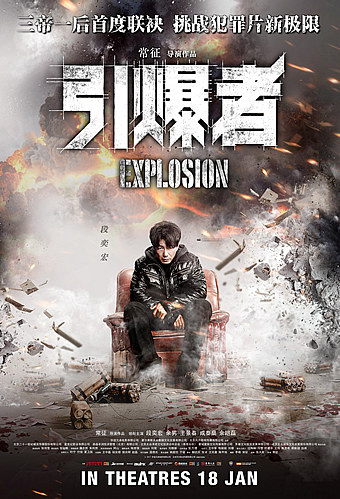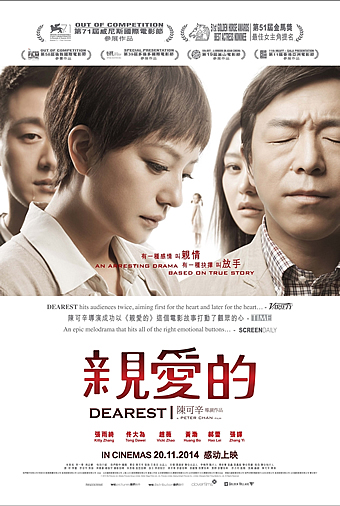THE LOOMING STORM (暴雪将至) (2017) [SCFF 2018]
Genre: Drama/ Crime
Director: Dong Yue
Cast: Duan Yihong, Jiang Yiyan, Du Yuan, Zheng Wei
Runtime: 1 hr 56 mins
Rating: PG13 (Some Coarse Language)
Screening Dates: 28 April 2018 (visit scff.sg/films/the-looming-storm/ for showtimes)
Synopsis: Yu, a self-assured factory guard who is laid off from a steel factory, fancies himself a detective and begins poking his nose into a murder investigation. Things become more complicated in this Chinese film noir dealing with love and destiny.
Movie Review:
China has undergone tremendous economic and social changes over the past two decades, and cinematographer-turned-filmmaker Dong Yue’s first feature reflects on that from the perspective of those “left behind”. Significantly, the movie is largely set in 1997, which not only saw the death of its leader Deng Xiaoping but also the handover of Hong Kong from the British back to the Chinese Government. It is therefore no coincidence that one of the key supporting characters, a kind-hearted prostitute named Yanzi (Jiang Yiyan), dreams of escaping her current life by moving to Hong Kong and starting a salon. It is also no coincidence that the events unfold in a dying industrial town of metal smelting factories, where hundreds of workers find their livelihoods in upheaval following the state-forced closure of unprofitable state-owned enterprises.
Indeed, an overwhelming sense of loss, despair and hopelessness pervades the film, which is almost entirely drenched in brackish, rain-soaked grays to emphasise the industrial alienation and small-town desolation. There is certainly nothing cheery about the string of murders that are occurring around the town, the victims young women left naked from the bottom down, struck by a blunt object at the back of their heads and with knife wounds all over their bodies. But even as its subject matter is a murder mystery, this is not a whodunnit or even a howdunnit; rather, Dong, who also wrote the screenplay, has crafted his movie as a character study of Yu Guowei (Duan Yihong), the chief of security of one of the factories in the town who is tangentially involved in the investigation of one of the murders and becomes obsessed with tracking down the murderer on his very own.
In fact, we first meet Yu spelling his name while applying for his new identification in the year 2008, ten years after serving time for an as-yet unexplained offence. Not once but twice does he explain how his surname is also the same word for “remnants” or “unnecessary”, thus setting the context for the ensuing narrative. Turning the clock ten years back, we see Yu at the scene of a woman’s gruesome murder, which happens to be just behind the factory where he is employed as the head of security. Right from the start, it is obvious that Yu is all too eager to play detective – not only does he round up the employees who were not at work that day to record their statements at the police station, he revisits the scene with his loyal assistant Xiao Liu (Zheng Wei) determined to find what the police chief Zhang (Du Yuan) and his men have missed.
At least for the first hour, it does appear that Yu may be onto something. He visits the open-air stadium where the workers from the neighbouring factories hang out to dance with the local prostitutes and then some. He posts a photo of a pair of keys he finds at one of the crime scenes on the notice boards outside the factories in a bid to lure the murderer out. And last but not least, Yu and Xiao Liu have a run-in with a hooded man who just might be the murderer, although that extended chase through a decrepit factory and the neighbouring railroad yard has cruel implications that further hardens his resolve to catch the suspect by himself. The subsequent hour explores just how far he is prepared to go, and that in turn has tragic consequences for the person he unknowingly manipulates to be part of his plan of ensnarement.
As much as it is a crime noir, those looking for the sort of payoff where Yu finally catches up to the killer or vice versa will undoubtedly be disappointed. There is still closure all right, but probably not in the way that you’re expecting. Like we said earlier, this is less a detective mystery than it is a character study, and let’s just say that Yu’s path actually brings him further away from the murderer, even as it is one marked by heartbreak and misfortune. Some may certainly wish that the plotting had intertwined the two more closely together, but in diverging the two, Dong actually makes it even clearer how much Yu as well as Yanzi are both searching for purpose and meaning in their respective lives amidst the inexorable progress of the larger society.
Thanks to Duan’s superb stripped-down performance of a man struggling to keep his reality from falling apart, Dong’s film remains riveting from start to finish even as it settles into a more deliberate pace in the latter hour. Duan and Jiang also share an understated chemistry in their scenes together, perfectly convincing in their mutual affection despite keeping it chaste, and we’d even go as far to say that Jiang’s candid portrayal turns her character into the heart and soul of the movie. This is especially as later events call into question the integrity of Duan’s narration of past events, somewhat undermining our sympathy for his character.
That said, it isn’t clear that Dong wants us to empathise with Yu – after all, his fate is as much a consequence of the system as it is of his own flawed choices. But in ‘The Looming Storm’, Dong has crafted a socio-political crime drama that speaks to the tumultuous changes that many of lower-income Chinese society found themselves struggling to keep up with, especially peasants who migrated to the factories for work and found themselves suddenly having to return back to their homeland. It’s depressing all right, and filmed in muddy shades of green, grey and yellow, Dong makes a movie entirely befitting in tone and atmosphere..
Movie Rating:




(Drenched in rain and greys, this dark, depressing but utterly riveting character study - under the guise of a crime noir - is potent socio-political commentary of those 'left behind' in Chinese society amidst economic and social upheaval)
Review by Gabriel Chong
You might also like:





